- Home
- John Jakes
The Rebels: The Kent Family Chronicles Page 32
The Rebels: The Kent Family Chronicles Read online
Page 32
“Lie down,” Philip said. “I wish it was Boston too.”
Awake and miserable, Royal asked, “Does this place have any name at all?”
“Captain Webb said it’s called Valley Forge.”
Royal collapsed against him like a child, burrowing against Philip’s filthy coat and starting to sob again:
“I’m sorry, I—I shouldn’t cry, it’s—not manly, but—I can’t help it—”
“Go ahead, Royal. There’s nothing to be ashamed of. Christ, I’d cry too if I had any strength left.”
Philip pulled the soaked tent canvas up over his head as the rain started falling again.
ii
By January, axemen felled enough timber for construction to start on a hut city on the plateau that took its name from a Quaker-owned iron works beside Valley Creek. The works had formerly supplied Washington’s army; the British had stopped in September to burn it out.
The commanding general, who had finally moved into a fieldstone house near the junction of the creek and the river, ordered regulation army huts built by each unit. Philip and the men of his company spent their days laboriously putting up theirs according to the approved design: fourteen by sixteen feet, with a rise of six and a half feet to the steep timbered roof. They had a chimney chinked with cat and clay, but no windows.
And no meat, other than an infrequent issue of salt pork.
And no yellow soap to bathe their filthy, infected, foul-smelling feet.
And no drinking water save what they could carry from the partially frozen creek.
And no hope. Worst of all, no hope.
iii
A knock at the hut door brought Breen’s head up where he lay dozing. Just as quickly, he lay down again and snored. Breen had spent three pence for a gill of peach brandy at the sutler’s. Philip had purchased a quart of vinegar instead.
One of the camp physicians had told him vinegar would keep his gums from bleeding; prevent his skin from bursting open with countless sores. Philip hated drinking the vile stuff. But the doctor had apparently been right. Breen wouldn’t waste his money on vinegar, and his already malodorous person had fallen prey to the scurvy. So had a good percentage of the eleven thousand men settled in for the winter in the hut city.
The knock came again, more insistently. With a disgusted sigh, Philip turned over the last of three fire-cakes heating on the stones next to the fireplace logs. That was their evening meal: peach brandy—or vinegar in Philip’s case—and flour mixed with water, then cooked till it hardened. Wind whined in the chimney, blowing smoke back in Philip’s face as he said:
“Will you see who’s there, Royal?”
The younger man nodded apathetically, shuffled to the door on rag-covered feet. He opened the door to admit a gust of snow—and Captain Webb, who hardly resembled an officer any longer.
Webb was hatless, white crystals powdering his hair. He wore an old padded blue dressing gown he’d adopted for warmth on night duty. In the distance, above the wind’s wail, Philip heard men bawling a contemptuous song around some campfire, to the tune of the marching air Yankee Doodle:
“First we’ll take a pinch of snuff,
“And then a drink of water—”
Raising his head again, Breen focused his eyes until he identified their visitor. Then he passed wind, loudly.
Webb said, “I appreciate your gesture of respect.”
“Think nothin’ of it. You finally bringin’ us some replacements? Food would be too much to ask—”
“I’m hunting for cards and dice,” Webb snapped. “The general’s making an inspection tour this evening.”
“Likes to keep track of our luxurious livin’ conditions, does he?”
“For God’s sake, Breen, that doesn’t help anything.”
“Captain Webb’s right,” Philip put in. Breen shrugged, uncaring.
“You know how set against gaming the general is,” Webb said, too tired—as they all were—to worry about breaches of discipline and courtesy. “Some bunch of nabobs called a Committee of Conference rolled in from York this afternoon.”
“The Congress is sitting at York now, isn’t it?” Royal asked.
“Correct. The committee’s purpose is to inspect and improve on conditions here, if possible.”
Another oath from Breen indicated what he thought of the whole idea. The singers in the distance were repeating their chorus with an even nastier intonation to the final lines:
“And then we’ll say, How do you do?
“And that’s a Yankee supper!”
“That won’t be hard,” Philip said. “I swear to God, Captain, if we don’t get some decent food, there’ll be a riot like nobody’s ever seen before.”
“And clothing,” Royal added, pointing at his bandaged feet. The brown of dried blood shaded into the green of pus.
Philip hadn’t spoken idly. For days now, as the bitter January sleet and snow continued without letup, certain sections of the hut city had taken to chanting “No meat! No meat!” for half an hour every evening. The poison of incipient rebellion was spreading through the entire encampment.
“There’s nothing I can do about that tonight,” Webb told them. “I just want you to look reasonably sharp if the dignitaries come this way.”
“You know where you can put them dignitaries,” Breen said, farting again. “Will you shut the fuckin’ door before we freeze to death?”
Looking defeated, Captain Webb withdrew into the snowy darkness. Philip closed the door.
He almost said something to Breen about his discourtesy to the officer. But such talk wasn’t uncommon, and was seldom punished. Besides, Philip identified it for what it was: not a disease, but the symptom of a disease. The problem Henry Knox had predicted still plagued them. They were amateurs at war, and except for a few isolated victories now forgotten, they had performed badly. Untrained as soldiers, they could hardly be expected to behave like soldiers.
Philip had no answer for the problem. But he knew it could only grow worse unless something drastic happened.
Saying little to each other, Breen, Royal and Philip ate their hard, blackened fire-cakes. Moments later, Philip experienced one of his frequent attacks of nausea because of the hut’s almost insufferable stench. Their unwashed bodies, Royal’s diseased feet—and Breen’s stubborn refusal to expose himself to the winter air to urinate—created a stew of smells Philip could bear only so long. He drank another half cup of vinegar, put on his tattered coat and hurried out to the company street.
Head down, eyes slitted against the wind-whipped snow that had come at nightfall, he trudged aimlessly between the uniformly built log huts facing one another on both sides of the dirt avenue. The rows of huts were perhaps the only detail in all of Valley Forge that gave the encampment a semblance of order.
In the distance he saw an immense bonfire blazing near the artillery park where Henry Knox kept his cannon. He thought briefly of going to see his friend. But just as he did, he heard strident voices off to his left.
He peered between two huts, glimpsed lanterns a-bob in the next street. He thought he recognized the tall, angular figure of Washington, cloak flapping like wings at his shoulders. A party of officers and civilians had halted around the general. An argument was in progress.
Philip dodged between the huts, huddled against the logs, numb hands in his bottomless pockets. He heard one of the civilians say:
“—distressing and unbelievable filth, General. Corrective measures must be taken, and swiftly.”
Suddenly Washington snatched off his tricorn and slammed it against his right leg:
“Corrective measures, sir? Why don’t you gentlemen in Congress take corrective measures? Hire honest teamsters, instead of cheats who drain the brine from the salt pork barrels to lighten the load, then deliver us spoiled meat? Why don’t you hire men who can draw accurate maps? Half the supplies we’re sent never arrive because the drivers get lost for want of proper directions, and finally dump their grain
sacks in empty fields to rot!”
Another member of the committee spoke up:
“Yes, those criticisms are fully merited. The Congress is aware—”
“I don’t give a damn whether they’re aware, I want to know what’s being done to change things!”
“We intend to return with a full report.”
“On the miserable state of affairs you’ve discovered?”
“Certainly we shall have to detail that, but—”
Another disgusted oath from Washington. “So instead of help for these brave men, I’ll receive remonstrances and more remonstrances. Well, let me assure you and all the gentlemen of the Congress—” Even above the singsong of the wind, his furious voice could be heard a good distance. “—it’s a much easier and less distressing thing to draw remonstrances in a comfortable room by a good fire than to occupy a cold, bleak hill and sleep under frost and snow. Some of my troops are not yet hutted—you tell them that the immediate result of your visit will be a report instead of food and blankets!”
Yanking his cloak across his chest to protect his blue and buff coat from the pelt of the snow, Washington glared at his critics:
“And where is that German officer you promised for my staff?”
Another of the Congressmen said, “Baron von Steuben is having his credentials examined by one of our committees.”
“To perdition with your committees! I’ve heard his credentials and they’re more than satisfactory. Get him into this camp with a suitable rank and ready to assist me. I need someone who can teach these men proper military drill! At least they can learn something while they’re starving to death!”
“We shall do everything possible to expedite—”
The rest was blurred as the big general stamped past the front of the hut and out of sight, followed by the Congressmen and his officers with the lanterns.
Shivering by the hut wall, Philip thought about the reference to a German. Another of those volunteers?
Some, like Gil, had proved themselves brave and able; effective additions to the army. Others were held in contempt. But it was interesting to hear Washington tell a Congressional committee that he and his own staff lacked the ability to shape the Continental and militia units into a cohesive, well-trained force capable of fighting in the best European style.
Many at Valley Forge still called Washington a poor leader in combat. Yet Philip had heard few openly declare that they would refuse to continue to serve under him. Specific complaints were always directed at Washington’s senior officers, or the Congress. The general himself somehow escaped most of the direct criticism.
But Philip could understand that. The man was an aristocrat; yet he cared about the welfare of the ordinary soldier. He had a rare forthrightness when it came to admitting and correcting his own mistakes, and the lowest private was aware of it. Perhaps that was why Washington was admired even when his battlefield ability was questioned. Perhaps that was why, despite almost intolerable conditions, Valley Forge hadn’t yet succumbed to insurrection and mass desertion—
Returning to the hut, Philip settled down to sleep. As he was drifting off, he speculated about the German officer. A baron, they’d said. The Germans were generally considered excellent in the field. The hired Hessians were respected, even if they were openly cursed and universally hated. Now Washington was getting his own German. It remained to be seen whether the man could accomplish anything.
The last flames flickered out on the hearth. Philip listened to Breen’s snores and Royal’s wheezy breathing. The wind had picked up. It howled around the chimney and blew fireplace ash back into the cramped, fetid room. Thoughts about the German were replaced by thoughts of Anne—and the familiar worry:
Why hadn’t she written? Was she safe in Cambridge? Did the silence spell illness? Or something worse—?
Under a violent gusting of the wind, the hut door flew open. Shivering, Philip leaped up to close it. He stared a moment into the snowy dark.
Annie, for God’s sake write me. Else I can’t go on here. I just can’t go on.
iv
Baron Friedrich Wilhelm Ludolf Gerhard Augustin von Steuben set the Valley Forge camp to buzzing when he arrived in February. He was accompanied by a trio of aides and a lean Italian greyhound called Azor. The dog trotted after the new inspector-general of the army wherever he went.
Philip first saw von Steuben two days after he reached the plateau. He didn’t quite know what to make of the officer.
The man rode well, looking huge and formidable in the saddle despite his middle age and a bandy-legged body. Some who had seen von Steuben hurrying through the camp on foot guffawed and said he waddled. They also said he could speak no English except the word “goddamn,” which he apparently used quite often. He and his suite had reached the New Hampshire coast the preceding December, presenting themselves to the Congress as available for service to General Washington.
Encountering Gil one February twilight near the sutler’s, Philip discovered that the Marquis de Lafayette was not impressed:
“That red uniform with the blue facings he sports? I have it on excellent authority that he disigned it himself. And that medal—faugh!”
Gil’s mouth pursed to emphasize his contempt. Studying his friend, Philip thought he detected more than a trace of jealousy.
“Have you seen it?” Gil asked.
“Yes. It is fairly large—”
“Large? It’s gigantic! A sunburst big as a soup dish—disgraceful ostentation, disgraceful! The Star of the Order of Fidelity of Baden-Durlach, he calls it. Well, my good friend, I am not certain he ever fought for Baden-Durlach—let alone under Frederick the Great whom he’s claiming as his ‘close associate.’ I am convinced his estate in Swabia is a fiction, just like the ‘von’ in his name—he probably added that himself, to enhance his credentials. He keeps prattling in that wretched French of his about having surrendered various ‘places and posts of honor in Germany’ in order to come here. But one can’t pin him down as to precisely what places or posts! If he was ever more than a subaltern, I am King Louis! And yesterday—yesterday he had the effrontery to tell mon ami General Washington that the officers in camp have too many servants! That the soldiers must not be kept so busy shining boots and laying fires in our huts, but must learn soldiering instead! Can you conceive of such advice coming from him? A rascal, a pretender, a windbag equally as mercenary as Howe’s Hessians? I understand his salary is incredible—another swindle of the Congress! Learn soldiering from a man like that? The very idea is an insult to the rest of us who have volunteered!”
“Well,” Philip said when the tirade sputtered to its end, “I heard one of his suggestions, and it seemed to make sense.”
“Pooh, that clock business?”
“Yes. I wonder why it never occurred to anyone else?”
Gil waved. “Because it’s unimportant.”
Von Steuben had reportedly made a scene when he discovered that not a single timepiece in all of Valley Forge was coordinated with any other. He had insisted that all clocks be synchronized with the one at Washington’s headquarters. In Philip’s view, Gil’s too-curt dismissal of the idea was evidence that he wished he’d thought of it.
“I repeat—you’ll learn nothing from a man who is patently an adventurer and a fraud,” was Gil’s final opinion before he and his friend parted. Philip hid his amusement at Gil’s professional hostility, deciding he’d wait and see.
The wait wasn’t long:
“Rothman, Kent, Breen,” Captain Webb said when he showed up at the hut a few evenings later. “Turn out on the parade field tomorrow at six. With muskets.”
Breen scratched his genitals. “Six in the evening?”
“Six in the morning.”
“Jesus Christ, what for?”
“The baron is organizing a special company. One hundred men from all units, to whom he’s going to teach musket drill and marching. The men will then teach other groups of a hundred. That damn Dut
chman is trying to turn this army inside out! He rises at three in the morning to write a drill text—and I understand he’s also developing a manual of procedures for officers.” Webb clearly didn’t care for that.
“Well, I sure ain’t wakin’ up at six—” Breen began.
“You’ll wake up at five thirty,” Webb cut in.
“—to take lessons from some fat-ass German,” Breen finished, emphatically.
“Like it or not, I’m afraid you will. The order to form the company of a hundred is direct from the commander-in-chief. So you’ll be there or you’ll be flogged.”
“Son of a bitch.” Breen shook his head. “I guess I’ll be there.”
Royal Rothman actually looked pleased at the news. He reached up to the small black cap pinned to his hair, plucked out something, crushed it between his fingers, threw it away, then said:
“It might actually be worthwhile, don’t you think, Philip?”
“It’s bound to be more diverting than hunting lice or watching your feet bleed.”
“Jesus Christ and the Holy Sepulchre,” Breen grumbled as Webb bent to go out into the bitter February wind. “Six o’clock in the fucking morning.”
v
Philip shivered in the dawn wind, gritty-eyed and yawning. The Baron von Steuben, his dinner-plate medal bouncing against his red-uniformed stomach, struggled to control his prancing horse. The greyhound Azor nipped at the horse’s legs, causing the brown-haired, round-faced inspector-general to lash downward with his crop:
“Azor, goddamn—nein!”
The dog temporarily at bay, von Steuben pointed his crop at the blushing captain from New York, Benjamin Walker, who was serving as his interpreter. The baron blistered a stream of French orders at Walker. The captain nodded feverishly every second or so until the harangue concluded. The French was mingled with German phrases, and Philip could follow it only with great difficulty.
Next to Philip, Breen used a few highly obscene words to characterize the peculiar man on horseback. Walker overheard but chose to overlook it. Von Steuben didn’t. If he failed to comprehend the specific words, he caught their general meaning. He fixed Breen with a glare that started the latter blinking rapidly.

 The Bastard
The Bastard The Furies
The Furies The Bold Frontier
The Bold Frontier The Americans
The Americans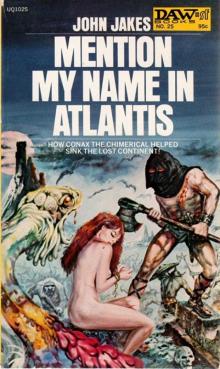 Mention My Name in Atlantis
Mention My Name in Atlantis California Gold
California Gold North and South
North and South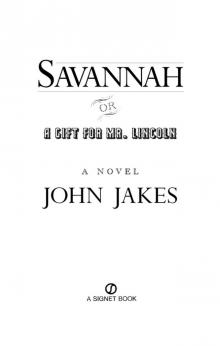 Savannah, or a Gift for Mr. Lincoln
Savannah, or a Gift for Mr. Lincoln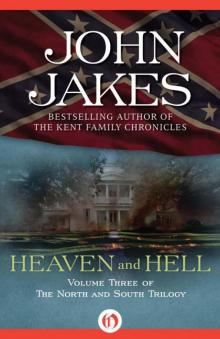 Heaven and Hell
Heaven and Hell Homeland
Homeland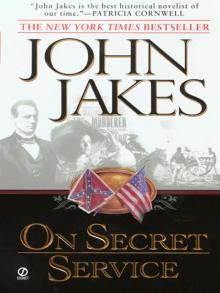 On Secret Service
On Secret Service The Lawless
The Lawless The Titans
The Titans The Seekers
The Seekers Love and War
Love and War North and South: The North and South Trilogy (Book One)
North and South: The North and South Trilogy (Book One) North and South Trilogy
North and South Trilogy Love and War: The North and South Trilogy
Love and War: The North and South Trilogy North and South: The North and South Trilogy
North and South: The North and South Trilogy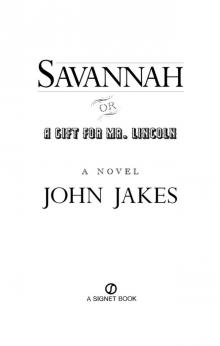 Savannah
Savannah Lawless
Lawless Conquest Of The Planet Of The Apes
Conquest Of The Planet Of The Apes Love and War: The North and South Trilogy (Book Two)
Love and War: The North and South Trilogy (Book Two) The Rebels: The Kent Family Chronicles
The Rebels: The Kent Family Chronicles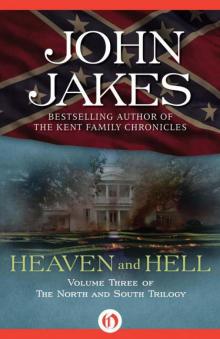 Heaven and Hell: The North and South Trilogy
Heaven and Hell: The North and South Trilogy Planet of the Apes Omnibus 2
Planet of the Apes Omnibus 2 The Bastard: The Kent Family Chronicles
The Bastard: The Kent Family Chronicles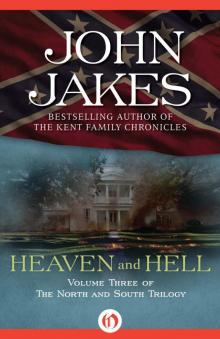 Heaven and Hell: The North and South Trilogy (Book Three)
Heaven and Hell: The North and South Trilogy (Book Three)